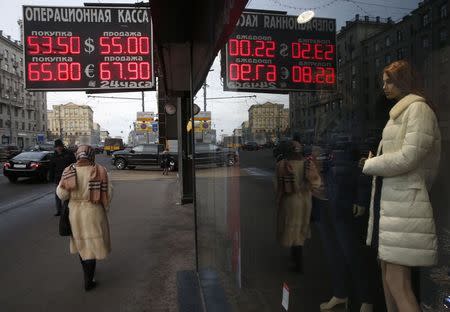Scramble for safety as ruble, oil sink

By Patrick Graham LONDON (Reuters) - Oil's plunge below $60 and the failure of Russia's huge emergency rate hike to stabilize the ruble jolted global markets on Tuesday, adding to a growing sense of crisis and a volatile end to 2014. The ruble sank to more than 80 per dollar, down 20 percent on the day, despite Russia's central bank ramping up interest rates overnight to 17 percent from 11.5 percent. Moscow's dollar-denominated stock exchange dived almost 20 percent. In a morning of sharp swings across Europe and the Middle East, Dubai's market, which is heavily exposed to oil, fell 7 percent while the Norwegian crown, another oil currency, sank as much as 5 percent. After a bumper few years driven by huge amounts of cash pumped into the financial sector by the world's central banks, the struggle for growth in Europe and Japan and a slowdown in China has left investors deeply concerned over the shape of things to come. The result has been a surge in stock market volatility to levels not seen in two years, and a flood of money out of emerging markets and into traditional safe havens like the yen and dollar. ""We always knew that the dollar's rise would send a shock through emerging markets, and we can see that is happening," said Neil Mellor, a currency strategist with Bank of New York Mellon in London. Yields on 10-year German government bonds - one of the last refuges for investors' in times of stress - sank to record lows. Yields fall as prices rise. Russia's problems have been seen as stemming chiefly from the fall in the price of oil and the increasingly tough sanctions imposed on it by the U.S. and other trading partners in response to its actions in Ukraine. But Russian companies also face a $35 billion spike in corporate debt repayments they must make in dollars in the fourth quarter, made all the more costly by the broader rise of the dollar this year. The bigger worry, underlined by the Bank of International Settlements earlier this month, is that the dollar's strength may lead to such tensions over corporate finances being repeated across the developing world. GROWTH CONCERNS The turmoil adds to the case for U.S. Federal Reserve chief Janet Yellen keeping her outlook for monetary policy very loose - and by implication official returns on the dollar lower for longer - at a meeting ending on Wednesday. Concerns over growth were also amplified by a downbeat survey of manufacturing in China, which weighed on Asian shares. Similar surveys in the euro zone, allied to better trade numbers, offered some support. But by midday Europe's main markets were all as much as half a percent lower. "This might be a good entry point but we need to see some stabilization in Russia and you have the Greek elections coming up, and that can cause some volatility,” said Joost van Leenders, investment specialist for allocation and strategy at BNP Paribas Investment Partners. U.S. stock futures pointed to minimal falls at the open. MSCI's broadest index of Asia-Pacific shares outside Japan fell 0.8 percent as investors dumped riskier assets, and the Indonesian rupiah skidded to a 16-year low. Japan's Nikkei stock average skidded 2 percent. Crude prices fell again, by nearly 3 percent, putting Brent crude under $60 for the first time in more than five years. UAE Oil Minister Suhail Bin Mohammed al-Mazroui said there was no need for OPEC to hold an emergency meeting, reinforcing the idea that major Gulf producers are ready to wait out lower prices. (Editing by Hugh Lawson)

